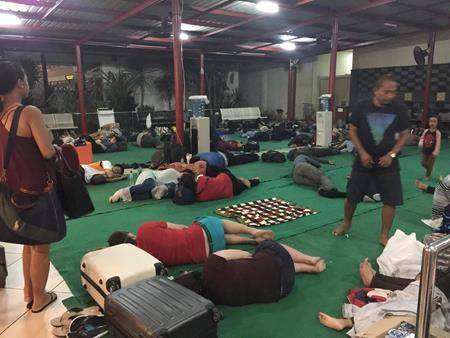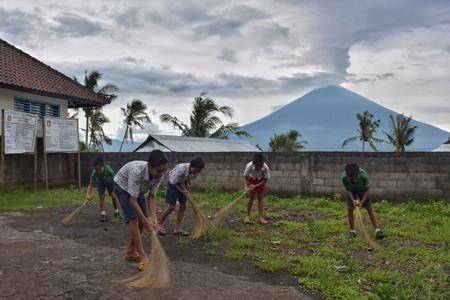Flights trickled out of Bali a day after its airport reopened but the erupting volcano there shut down air travel to a neighbouring Indonesian island Thursday, showing the continued risk to aircraft from the towering ash clouds.
Mount Agung has been gushing black-grey columns of volcanic dust and steam since the weekend and glowing a dramatic red at night as lava wells in its crater.
Bali’s airport was closed from early Monday until Wednesday afternoon, stranding tens of thousands of travellers on the idyllic resort island famous for its Hindu culture, surf beaches and lush interior.
It reopened after the hazardous ash clouds changed direction, but the threat has now closed the small international airport on Lombok island until at least Thursday evening.
Australia’s Jetstar said it would have 16 flights out of Bali on Thursday, six more than usual, which would take about 3,500 Australians home. Two South Korean airlines said they were sending charter flights on Thursday, one to Bali and another to Surabaya on the neighbouring island of Java, which some tourists have reached by ferry and bus, to collect as many as 700 Koreans.
Figures from the airport showed 23 flights, mostly domestic, carried about 1,600 passengers out Wednesday. Inbound flights included a Singapore Airlines jet with only two passengers.
The volcano was erupting less furiously Thursday. The Disaster Mitigation Agency said the ash plume was rising about 2,000 metres above the crater, about half its previous height. As ash has drifted away from the mountain, it has reached heights of 25,000 feet (7,600 metres), posing a threat to aircraft.
Despite the all-clear for Bali’s airport, flights are unlikely to rapidly return to normal levels and a change in the direction of the ash or a new more powerful eruption could force the airport’s closure again.
President Joko “Jokowi” Widodo ordered ministries and agencies, the military and police to help Bali’s government deal with the disaster, and he has urged anyone inside the mountain’s exclusion zone to get out “for the sake of their safety.”
Authorities have told 100,000 people to leave an area extending up to 10 kilometres (6 miles) from the volcano. About 40,000 people are staying in 225 shelters, the disaster agency said, but tens of thousands more have stayed they feel safe or don’t want to abandon homes and livestock.
In the village of Tulamben inside the exclusion zone, farmers were plowing their fields with cattle Wednesday, seemingly unbothered by the smoking mountain behind them swelling with orange lava.
In Sukadana village, about 8 kilometres from the crater, a few remaining residents said mudflows of volcanic debris and water had passed through the area for a couple of days before solidifying.
Some stranded tourists managed to get off the island before the airport reopened, but they faced an arduous journey involving crowded roads, buses, ferries and sometimes overnight waits in yet another airport in Surabaya on the island of Java.
“This is a very unforgettable experience for us. So much hassle and definitely one for the books,” said Sheryl David, a tourist from Manila, Philippines, who arrived Saturday in Bali with three friends and was supposed to leave Tuesday. She said the experience didn’t dampen her feelings about the island.
“Yes, still a paradise,” she texted.
The volcano’s last major eruption, in 1963, killed about 1,100 people, but it is unclear how bad the current situation might get or how long it could last. A worst-case scenario would involve an explosive eruption that causes the mountain’s cone to collapse.
“An analogy would be the twin towers collapsing in New York on 9-11,” said Richard Arculus, a volcano expert at Australian National University. “You saw people running away from the debris raining down and columns of dust pursuing people down the street. You will not be able to outrun this thing.”
Indonesian officials first raised the highest alert two months ago when seismic activity increased at the mountain. The activity decreased by late October, and the alert was lowered before being lifted to the highest level again Monday.
Indonesia sits on the Pacific “Ring of Fire” and has more than 120 active volcanoes.
____
Associated Press journalists Ali Kotarumalos and Margie Mason in Jakarta, Indonesia, and Kiko Rosario in Bangkok contributed to this report.
Stephen Wright, The Associated Press
Like us on Facebook and follow us on Twitter.




